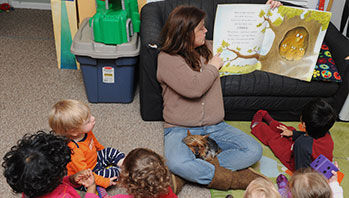- markers
- wand and green hat (optional)
- music
- musical instrument
- musician
MA Standards:
English Language Arts/Literature/RL.PK.MA.1: With prompting and support, ask and answer questions about a story or a poem read aloud.
English Language Arts/Literature/RL.PK.MA.9: With prompting and support, make connections between a story or poem and one’s own experiences.
Head Start Outcomes:
Literacy Knowledge/Book Appreciation and Knowledge Asks and answers questions and makes comments about print materials.
Social Emotional Development/Self-Regulation Recognizes and labels emotions.
Social Emotional Development/Self-Concept and Self-Efficacy Identifies personal characteristics, preferences, thoughts, and feelings.
PreK Learning Guidelines:
English Language Arts/Reading and Literature 6 Listen to a wide variety of age appropriate literature read aloud.
English Language Arts/Reading and Literature 10 Engage actively in read-aloud activities by asking questions, offering ideas, predicting or retelling important parts of a story or informational book.
Health Education 16 Recognize and describe or represent emotions such as happiness, surprise, anger, fear, sadness.
Read Together: Abiyoyo #2

© Commonwealth of Massachusetts, Department of Early Education and Care (Jennifer Waddell photographer). All rights reserved.
ELA Focus Skills: Concepts of Print, Listening and Speaking, Making Connections, Story Comprehension, Vocabulary
Before You Read
Tell children you are going to reread Abiyoyo by Pete Seeger. Show the book cover and ask children what the boy and his father are doing. Point out how carefully the boy is listening to his father tell a story.
Explain that the author, Pete Seeger, writes books but he also writes songs. Say, The author of this book also wrote the music for the song “Abiyoyo.” Open the book to a page with the musical notes. Point to and explain that each mark is a musical note that shows a musician how to play the song on his or her musical instrument.
As You Read
Read the first sentence “Once upon a time, there was a little boy who played the ukelele.” Point to the picture on the first spread and ask,
- What is the boy doing? What is the dad doing?
- How do you think the people in the town feel about the boy’s music and the dad’s tricks?
As you turn the pages, continue to ask children what is happening in each illustration.
After You Read
Talk about the effects of music on Abiyoyo and help children make connections. Ask questions such as,
- What happens when Abiyoyo first hears the music the boy plays on his ukulele? What does it make Abiyoyo do?
- How do you think Abiyoy feels when he first hears the music? Why do you think that?
- Then ask, What happens when you hear music? How does it make you feel when you hear music playing?
- Give children toy instruments and invite them to play music for each other.
